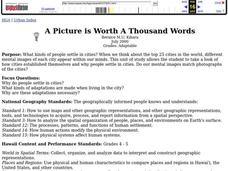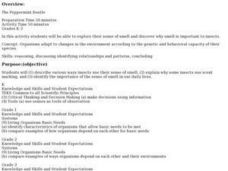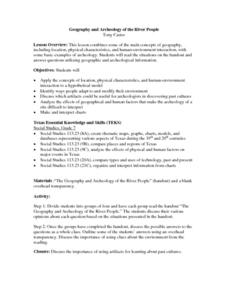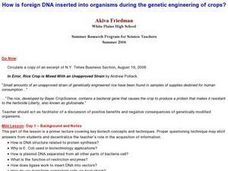Curated OER
A Picture Is Worth A Thousand Words
Students complete a population pyramid for a city they are studying. They may complete a population pyramid for their city and another one for the country in which the city is located. They compare and contrast the results of the two...
Curated OER
Temperature Variations and Habitability
Young scholars, in groups, evaluate conditions outside the building and inside the classroom using thermometers, barometers, anemometers, etc. They compare interior and exterior conditions. They consider and discuss factors that...
Curated OER
Chinese Lanterns - Technology
Fifth graders investigate the type and use of lanterns in Chinese history, their cultural significance and their role in today's society. They watch a lantern maker and describe the process. Students compare and discuss a range of...
Curated OER
The Peppermint Beetle
Students describe various ways insects use their sense of smell, and examine why some insects use scent marking. They conduct a scent hunt, searching for a particular scent on the trees on school grounds.
Curated OER
Researching the World's Oceans
Students research and compare important features of the oceans based on current data. They examine the globe or map, determine the major oceans of the world, and record their names on the data sheet.
Curated OER
Election-Year Issues: Where Do the Political Candidates Stand?
Students create a multimedia presentation to compare the platforms of political candidates using information gathered from their research.
Curated OER
Geography and Archeology of the River People
Seventh graders work together in groups to read a handout and answer questions about the geography and archeology of a group of native peoples. As a class, they discuss their opinions and answers and the importance of using artifacts to...
Curated OER
How is Foreign DNA Inserted into Organisms During the Genetic Engineering of Crops?
Pupils examine the positive benefits and negative consequences of genetically modified organisms following a lecture covering key biotech concepts and techniques. Students then conduct and experiment comparing the travel rate of plasmid...
Curated OER
Sex and the Single Bacterium
Learners become familiar with microbiology and biotechnology laboratory techniques and observe the results of antibiotic resistance transfer from one bacteria to another via conjugation. They then calculate the "mating efficiency" by...
Curated OER
Shapes are Everywhere
Second graders gain an understanding of geometric shapes and spatial reasoning. They learn the attributes of solid shapes in everyday activities. Students compare geometric shapes to everday objects, finding things that serve a purpose...
Curated OER
The Effect of Tides & Elevation on Wetland Plant Communities
Students comprehend how tides can impact shoreline plant communities through the study of a freshwater tidal marsh. They use actual tidal data to show that tidal ranges differ among geographic locations, even those relatively close...
Curated OER
Polymerase Chain Reaction and DNA Profiling
Students examine DNA fingerprinting and polymerase chain reaction and how they are used in everyday life and for criminal investigations. They discover how these techniques can also be used to answer ecological and evolutionary questions.
Curated OER
Show Me the Money!!!
Students research employment rates in the United States with a focus on broadcast journalists. In this employment rate lesson, students visit the given websites to explore popular states to live in, highest and lowest unemployment rates,...
Curated OER
Lights in the Deep
Students describe, compare, and contrast bioluminescence, fluorescence, phosphorescence, and chemiluminescence. They explain the role of three major components of bioluminescent systems. They ex
Curated OER
Mirror, Mirror
Learners examine portraits done by Robert Harris and discuss the technique he used to create them. With a partner, they paint a picture of each other using the techniques of Harris. They also make a drawing of themselves from a recent...
Curated OER
Lake Billy Chinook
Students explore aerial photographs and maps of Round Butte Dam. They examine the land modifications necessary to create a dam. After reading a book about building a dam, students compare the environmental impact of Lake Billy Chinook to...
Curated OER
Groundwater Modeling
High schoolers evaluate the effects of point and non-pointy sources of water pollution using a model. They assess human impact on water quality. Students build a model which represents an aspect of the hydrosphere and compare their model...
Curated OER
East Asia--The Asian Holocaust
Ninth graders study the effects of the Asian Holocaust by comparing it to the Nazi Holocaust. They view a Power Point and discuss the comparisons between both Holocausts. As they compare and contrast both, they discuss their reactions...
Curated OER
Types of Legs
Students identify the characteristics of the legs of arthropods as well as how they are used. They compare and contrast the legs of various types of bugs in the arthropod family. A comparison worksheet is included in with this lesson.
Curated OER
Gun Control
Students spend time on the web comparing and contrasting documents about gun control. They then prepare a paper discussing the usefulness, trustworthiness, and bias of two similar topic sites.
Curated OER
The Debate Over North Shore Road
Students examine the impact of the North Shore Road Project in North Carolina. In this environmental science lesson plan, students share their views regarding this environmental issue. They compare and contrast the map of the Great Smoky...
Curated OER
Earthquakes
Students research statistics about the last five large earthquakes. They compare data in small groups and present their information orally to the class. They also attempt to predict the next large earthquake.
Curated OER
Defining Childhood Across Cultures
Young scholars define the word "child" in different cultures. In groups, they brainstorm how they define the word and compare and contrast the various definitions. They interview their penpals in other countries and share their results...
Curated OER
Got Park? Or if you build it, they will come!
Young scholars use GIS and GPS technology to evaluate, research, locate, and recommend where a new park should be located that benefit the community.

























